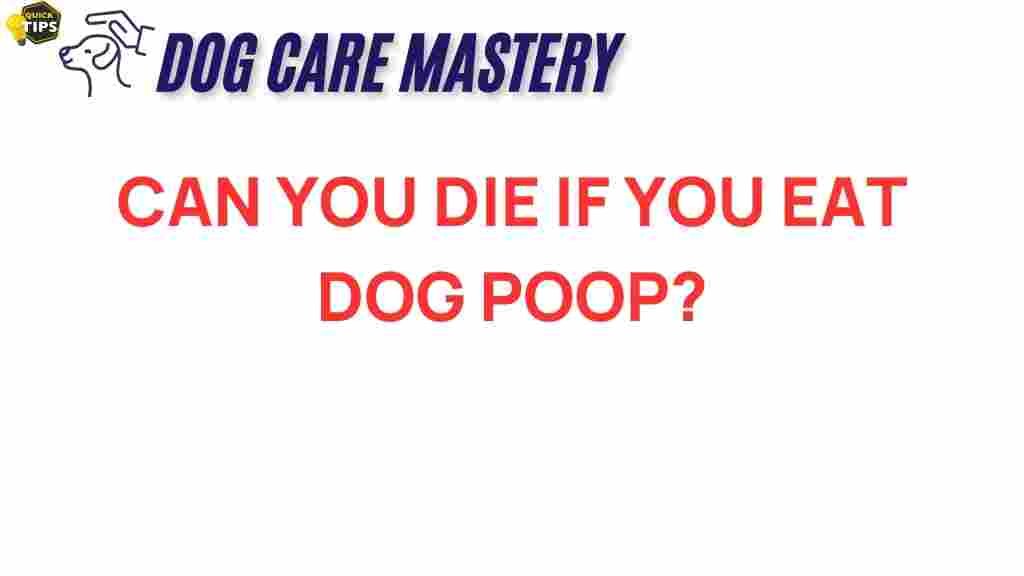The Shocking Truth: Can Eating Dog Poop Actually Endanger Your Life?
When it comes to pets, our furry friends can be a source of joy and companionship. However, as pet owners, we must also be aware of the potential dangers that accompany our pets’ behaviors, particularly when it comes to their waste. One of the more shocking topics that can arise is the consumption of dog poop. This behavior, known as coprophagia, can leave many pet owners alarmed and questioning the safety and health implications for both their dogs and themselves. In this article, we’ll delve into the shocking truth about dog poop and whether it can actually endanger your life.
Understanding Coprophagia
Coprophagia is the act of consuming feces, and while it is commonly observed in dogs, it can also occur in other animals. This behavior can be motivated by various factors, including:
- Instinctual Behavior: In the wild, some animals consume feces to keep their living area clean and to avoid attracting predators.
- Nutritional Deficiencies: Dogs may eat poop if they are lacking essential nutrients in their diet.
- Curiosity: Puppies, in particular, are naturally curious and may explore their surroundings by tasting things, including feces.
- Anxiety or Stress: Dogs may engage in this behavior when they are feeling anxious or under stress.
Health Risks Associated with Dog Poop
While many pet owners might dismiss coprophagia as a mere nuisance, consuming dog poop can pose serious health risks not only to the dog but also to humans. Here are some potential dangers:
- Parasites: Dog feces can contain various parasites, including roundworms, hookworms, and tapeworms. These parasites can be transmitted to humans, leading to serious health issues.
- Bacteria: Feces are breeding grounds for harmful bacteria such as E. coli and Salmonella, which can cause severe gastrointestinal illnesses in humans.
- Viruses: Diseases like parvovirus and canine distemper can be present in dog poop, posing a risk to other dogs and potentially to humans in rare cases.
Can Eating Dog Poop Endanger Your Life?
The short answer is yes, eating dog poop can endanger your life, albeit indirectly. Here’s how:
- Infections: If a person consumes dog feces, they might ingest harmful pathogens that can lead to infections. These infections can be particularly dangerous for individuals with weakened immune systems.
- Zoonotic Diseases: Certain diseases that can be transmitted from animals to humans, known as zoonotic diseases, can be transmitted through dog feces. This includes conditions like toxocariasis, which can lead to serious complications.
- Long-Term Health Issues: Continuous exposure to harmful bacteria and parasites from dog poop can lead to chronic health issues, which might take significant time and medical intervention to resolve.
Preventing Coprophagia in Dogs
To protect both your dog and yourself from the dangers of dog poop, it’s crucial to prevent coprophagia. Here are some effective strategies:
- Dietary Adjustments: Ensure your dog is receiving a balanced and nutritious diet. Consult your veterinarian to rule out any deficiencies or allergies.
- Regular Exercise: Provide ample opportunities for exercise to reduce boredom and stress, which can lead to coprophagia.
- Behavioral Training: Train your dog with commands like “leave it” or “no” to discourage them from eating feces. Positive reinforcement is key.
- Immediate Cleanup: Clean up after your dog immediately to remove the temptation to eat their own or other animals’ feces.
What to Do If Your Dog Eats Poop
If you catch your dog in the act of eating poop, here’s a step-by-step process to follow:
- Stay Calm: Reacting with shock or anger can create anxiety for your dog, which may worsen the behavior.
- Redirect Attention: Use a toy or treat to distract your dog and redirect their attention away from the feces.
- Clean Up Immediately: Ensure that you clean up any poop in your yard or during walks as quickly as possible to prevent further incidents.
- Monitor for Symptoms: Keep an eye on your dog for any signs of illness, such as vomiting, diarrhea, or lethargy, and consult your vet if necessary.
- Consult a Veterinarian: If the behavior persists, consult your veterinarian to rule out any underlying health issues or behavioral concerns.
Common Misconceptions About Dog Poop
There are several misconceptions about dog poop that can lead to misunderstandings about its dangers:
- “It’s just poop; it can’t hurt me.” – This is a dangerous belief. Dog poop can carry numerous pathogens that can harm humans.
- “Only sick dogs can transmit diseases.” – Even healthy dogs can carry parasites and bacteria in their feces.
- “All dog poop is the same.” – Different diets and environments can influence the type and number of pathogens present in feces.
Conclusion
In conclusion, the shocking truth about dog poop is that it can indeed pose significant health risks to humans and dogs alike. Understanding the reasons behind coprophagia, recognizing the dangers associated with dog feces, and taking preventive measures are essential steps for all pet owners. Maintaining your dog’s health through proper diet, training, and regular vet visits can minimize the risks associated with this behavior.
Always remember that while dogs bring joy and companionship into our lives, they also require responsibility and care. If you want to learn more about keeping your pets healthy, check out our comprehensive guide on pet care. For more information on the health risks related to dog poop, visit the Centers for Disease Control and Prevention website.
This article is in the category Health and created by dogcaremastery Team
